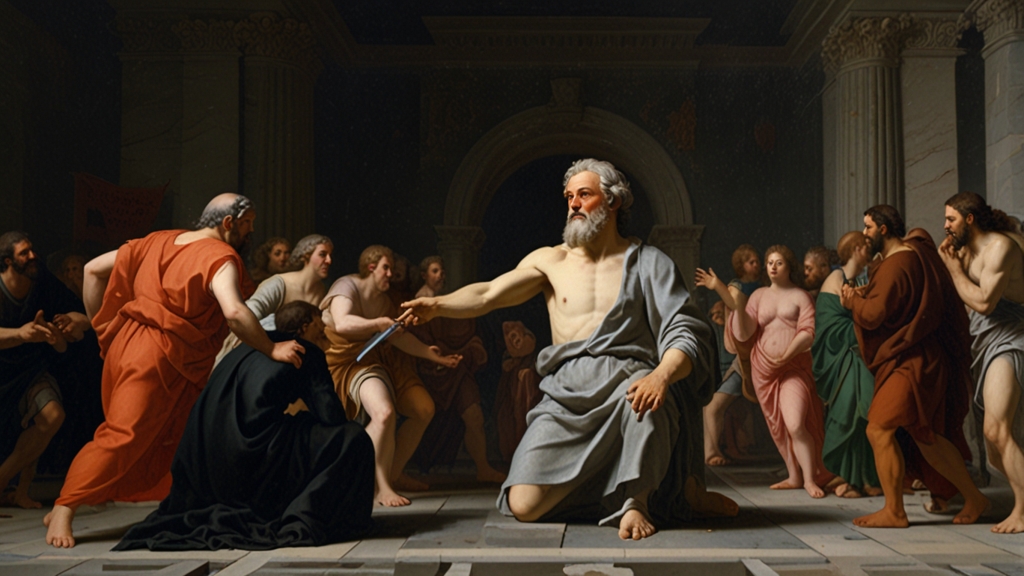Philosophy as a Weapon: The Power Dynamics of Ideas
Philosophy, often perceived as an esoteric and abstract discipline, has a profound impact on society and its power dynamics. Ideas shape the ways individuals and communities understand and interact with the world, laying the foundation for political systems, ethical norms, and social values. Throughout history, the manipulation and dissemination of philosophical thought have served as powerful tools in the arsenal of leaders, revolutionaries, and thinkers. This article explores the intricate relationship between philosophy and power, examining how ideas function as both a weapon and a shield in the ongoing battle for influence and control.
The Birth of Philosophical Power
The roots of philosophy as a tool for power can be traced back to ancient civilizations. In ancient Greece, philosophers such as Socrates, Plato, and Aristotle engaged in rigorous debates about virtue, justice, and the ideal state. Their ideas were not merely intellectual exercises; they shaped the political landscape of their time and influenced decision-makers. Plato's vision of the philosopher-king, for instance, underscores the belief in the inherent power of philosophical wisdom to govern and direct society.
Similarly, in ancient China, Confucianism and Daoism provided guiding principles for governance and social harmony. Confucianism, with its emphasis on hierarchical relationships and moral rectitude, became the ideological backbone of the Chinese bureaucratic state for centuries. The teachings of Confucius were embedded in the education system, ensuring that the ruling class was well-versed in these philosophical ideas, thereby reinforcing the existing power structures.
Philosophy as a Revolutionary Force
While philosophy can support and legitimize existing power structures, it also has the potential to challenge and transform them. The Enlightenment period in Europe serves as a prime example of philosophy functioning as a revolutionary force. Thinkers like John Locke, Voltaire, and Jean-Jacques Rousseau critiqued the established social and political order, advocating for individual rights, freedom, and equality. Their ideas ignited revolutionary movements across the continent, culminating in the French and American Revolutions.
"Man is born free, and everywhere he is in chains." – Jean-Jacques Rousseau
Rousseau's assertion encapsulates the radical potential of philosophical thought to dismantle entrenched systems of oppression. His work laid the groundwork for modern democratic ideals, highlighting the power of ideas to inspire collective action and drive societal change.
The Modern Battlefield of Ideas
In contemporary society, the power dynamics of ideas continue to play a crucial role in shaping public discourse and policy. The rapid dissemination of information through digital media has amplified the reach and impact of philosophical ideas, but it has also led to their increased weaponization. Competing ideologies vie for dominance in the public sphere, influencing everything from legislation to cultural norms.
For instance, neoliberalism—a philosophy promoting free markets, deregulation, and individualism—has dominated global economic policies for decades. Its proponents, such as Friedrich Hayek and Milton Friedman, have wielded substantial influence over policymakers, fostering economic systems that prioritize market efficiency over social welfare. Critics argue that this philosophical stance has exacerbated inequality and concentrated power in the hands of a few.
"Insofar as competition is superior... it is superior only because its results are made to serve and guide individual efforts." – Friedrich Hayek
On the other hand, contemporary movements like environmentalism and social justice draw from alternative philosophical frameworks that emphasize interconnectedness, sustainability, and equity. These movements challenge the dominant paradigms and advocate for systemic change, demonstrating the ongoing power struggle between conflicting ideas.
The Ethics of Philosophical Warfare
Given the profound impact of philosophy on power dynamics, the ethical implications of using ideas as weapons must be considered. Philosophical manipulation can lead to propaganda, misinformation, and intellectual coercion. The responsibility lies with thinkers, educators, and leaders to wield philosophical power judiciously, fostering informed and critical public discourse.
Ultimately, philosophy as a weapon underscores the potent and pervasive influence of ideas. The battle for power is not only fought on the physical and political fronts but also in the realm of thought. As individuals and societies navigate this complex terrain, the capacity to critically engage with and challenge dominant philosophies remains a vital tool in the pursuit of justice, freedom, and progress.










